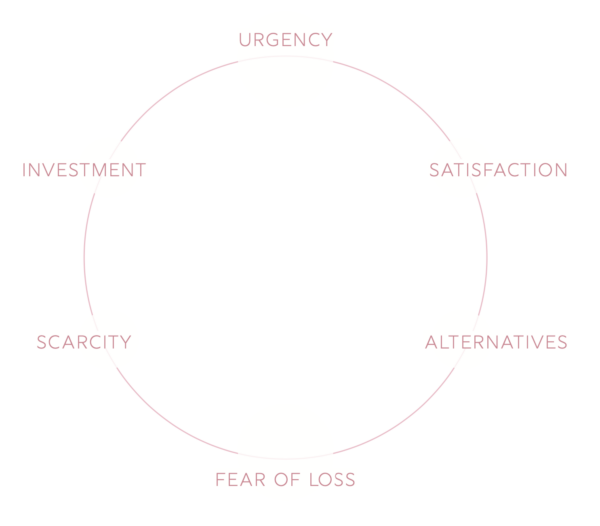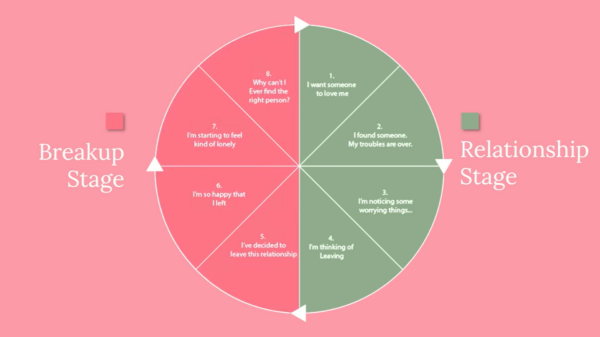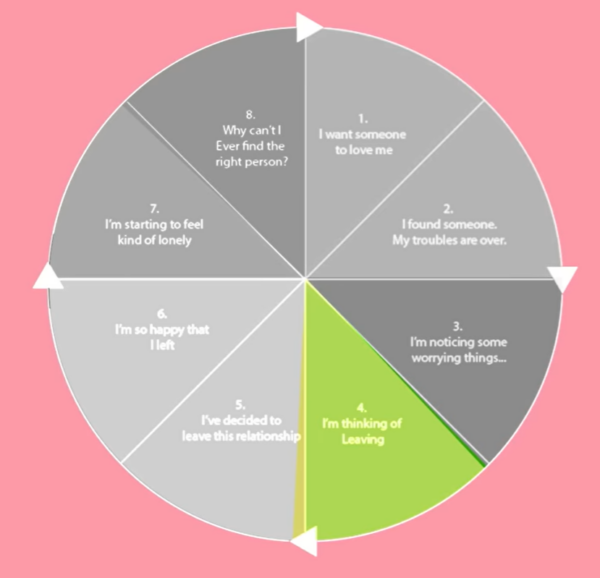This is a complete discussion on if it’s normal to suddenly fall out of love.
Honestly, I feel like there’s two questions embedded here with contradicting answers.
- Is it normal?
- Is it normal for it to happen suddenly?
Here’s what I think.
Generally speaking it is normal for someone to fall out of love. Feelings can change over time and are influenced by many factors, including personal growth, changes in life circumstances, and changes in the dynamics of the relationship itself. However, in my experience it is NOT normal for it to happen so suddenly. Often, it’s a gradual process that might not be fully recognized until a certain moment, which can make it seem sudden.
So, today I’d like to dig in and answer two more questions.
- Why People Tend To Fall Out Of Love
- The 8 Major Warning Signs That Signal It’s Happening
Let’s begin!

What Are Your Chances of Getting Your Ex Boyfriend Back?
Take the quizWhy People Tend To Fall Out Of Love
In my opinion, people tend to fall out of love for three major reasons:
- The Honeymoon Chemical Factor
- The GIGS
- You’ve Grown In Different Directions
But not many people delve into the true meanings or implications of these reasons. So, that’s what I’ll explore today, beginning with the honeymoon chemical factor.
What Is The Honeymoon Chemical Factor?
To understand this, you need a basic working knowledge of the neurochemicals in your body during the honeymoon period and throughout a relationship.
I believe it’s crucial to comprehend this before delving into my argument.
The potency of the honeymoon period is a result of five specific neurochemicals:
- Dopamine
- Oxytocin
- Vasopressin
- Norepinephrine
- Serotonin.
Each of these is responsible for different things.
- Dopamine, for instance, is a neurotransmitter associated with pleasure and reward.
- Oxytocin is often referred to as the ‘love hormone.’
- Vasopressin plays a role in long-term commitment and bonding.
- Norepinephrine, also known as noradrenaline, triggers your racing heart and excitement, often simulating feelings of being in love.
- Serotonin levels can actually decrease in the early stages of a relationship, leading to obsessive thoughts about your partner.
When these chemicals increase, or in the case of serotonin, decrease, they create the exhilarating sensation we call the honeymoon period.
However, as time progresses, these chemicals will naturally start to recede.
Here’s what that looks like,
And the shock of these chemicals balancing out and returning to their original levels can make individuals feel as if they are falling out of love.
We see many breakups at Ex-Boyfriend Recovery, and one pattern I’ve noticed is that people with dismissive avoidant tendencies often convince themselves that the feelings experienced during the honeymoon period equate to love, and they expect to feel this way constantly.
This is because the idea of a long-term relationship is daunting for them.
Whether consciously or subconsciously, once these chemicals level out, they interpret it as a sign to move on. In fact, they might bounce from one relationship to another, perpetually chasing the honeymoon phase.
When asked about their reasoning, they would say, ‘I fell out of love.’

What Are Your Chances of Getting Your Ex Boyfriend Back?
Take the quizBut in reality, they didn’t fall out of love; they simply transitioned out of the honeymoon period.
The Grass Is Greener Syndrome
To really grasp this, it’s necessary to understand why human beings commit to one another.
About a year ago, I published an insightful article arguing that there are six primary reasons why people commit to each other.
But ultimately, it’s a cost and benefit scenario.
We’re always seeking to maximize benefits and minimize costs.
The criteria we usually apply for this mental calculus consist of six factors:
- Satisfaction
- Alternatives
- Investment
- Scarcity
- Urgency
- Fear of loss
Some combination of these six elements often guides us toward commitment decisions.
However, what I’ve occasionally witnessed in people who fall out of love is the emergence of the grass is greener syndrome, which corresponds directly to the concept of alternatives.
From a commitment perspective, alternatives correlates to the question: ‘Can I find someone better than the person I’m with?’ Through life circumstances, daydreaming, or aligning with the dismissive avoidant nature, they sometimes convince themselves they’ve discovered this ‘better’ person.
In my experience at Ex-Boyfriend Recovery, it’s roughly an equal split between people whose ex-partners meet their ‘rebound’ while still in a relationship with our client.
This is the grass is greener syndrome in full effect.
The person convinces themselves they’ve found someone superior to their current partner, and as a result, they start to fall out of love with the latter.
For those with dismissive avoidant tendencies, they’re drawn to the concept of a ‘phantom ex,’ essentially, the one who got away.
It’s consistent with their behavior to constantly pine after this phantom ex, since this person is a mere specter—someone they don’t need to engage in a long-term committed relationship with, and therefore, someone who won’t trigger them.
You’ve Grown In Different Directions
In relationships, some people fall in love with the idea of maintaining the relationship as if it were a snapshot in time.
They fell in love with their partner when they were a certain way. But the undeniable reality of life is that we’re always changing, sometimes for the better, sometimes for the worse.
Who you are towards the end of a relationship often differs from who you were at the beginning, simply due to life’s inherent evolution.
We’re growing, evolving, aging, gaining more experience.
If one partner is attempting to preserve the status quo, refusing to grow with their partner, and opting for stagnancy instead, the partner who continues to evolve might think, ‘I’m not sure I love this person anymore.’
It’s not necessarily that they’ve fallen out of love.
They might still harbor feelings of love.
It’s that they want to continue growing and don’t want an anchor to impede their progress.
The 8 Warning Signs That Signal It’s Happening
Generally there are eight warning signs that you can be on the lookout for in order to tell if your partner, ex, whatever has fallen out of love with you.

What Are Your Chances of Getting Your Ex Boyfriend Back?
Take the quiz- Decreased interest in the partner
- Increased annoyance or irritation with the partner
- Feeling happier or more at ease when the partner is not around
- Lack of physical intimacy
- Fantasizing about a life without the partner
- Avoiding future plans
- Frequent disagreements or fights
- Feeling indifferent
Let’s dissect!
Reason #1: Decreased Interest
This often manifests when your partner doesn’t want to spend as much time together.
They don’t ask many questions about your thoughts or feelings, and they rarely share their own thoughts and feelings.
They also appear generally unenthusiastic about the relationship.
I’m known for introducing the concept of an ‘avoidant death wheel.’
Many of our clients are dealing with avoidant exes, and I’ve created an engaging graphic that illustrates the stages dismissive avoidants go through before and after a breakup.
Interestingly, there’s a stage in the ‘death wheel’ where an avoidant often gets triggered.
They start noticing troubling signs, and this decreased interest in the partner is part of that. They become less interested in spending time together and sharing their thoughts and feelings.
You might start noticing their increasing distance.
Reason #2: An Increase In Annoyance
Let’s revisit the concept of the honeymoon period.
When you’re in the midst of it, it feels like your partner can do no wrong. Small quirks might even seem endearing.
However, at a certain point in the relationship, once those love chemicals have leveled off, those cute habits or quirks can become less charming and increasingly bothersome.
This is closely related to the first point about decreased interest.
With less interest, your tolerance for habits or quirks that grate on your nerves diminishes. This forms a cumulative effect where your partner starts thinking, ‘I might be falling out of love.’
Eventually, they convince themselves, ‘I am out of love,’ and begin planning for a potential breakup. This is all part of the ‘relationship death wheel’ graphic I’ve been discussing.
That happens rigghhhttt about here:
Reason #3: Feeling Happier When Your Partner Isn’t Around
If someone consistently feels relief when their partner is away, it likely indicates they’re falling out of love.
I’ve personally experienced this.
I’ll never forget my very first girlfriend. Towards the end of that relationship, we were arguing every single day. Sometimes it was something she did that would trigger my insecurities. Other times it was just me acting foolishly, as 18-year-olds often do.

What Are Your Chances of Getting Your Ex Boyfriend Back?
Take the quizThe one memory I have from that relationship was actually feeling relief every time I hung up the phone with her after waiting for 10 or 20 minutes. It had nothing to do with her personally—she was kind-hearted and nice—it was just that we were like oil and water.
We simply didn’t mix well, and our constant arguing was exhausting.
When the arguments ceased, I felt a wave of relief.
Eventually, it got to the point where I started thinking, ‘I feel better when I’m not talking to her than when I am. Is it supposed to be like this?’
I often found myself online, reading about other people’s experiences with this feeling. It starts to bubble up to the surface, and you begin to plan, ‘Okay, I think I need to break up with this person, but I’m scared to do so.’
Reason #4: A Lack Of Physical Intimacy
At the beginning of the relationship, during the honeymoon period, public displays of affection often increase.
There’s a lot of hugging, hand-holding, and cuddling, and sexual activity is typically high.
Over time, it’s somewhat normal for this to decrease somewhat, but if it completely drops off, that’s a red flag.
If they show no desire to be intimate with you, or if non-sexual physical affection, such as hugging, holding hands, or cuddling, disappears, that, in my opinion, is a very bad sign.
Reason #5: They Fantasize About Life With Someone Else
This could range from harmless daydreams to serious considerations about breaking up or imagining what it would be like with someone else.
And I think that last point is key—what would it be like to be with someone else?
This relates back to the ‘grass is greener’ syndrome I discussed earlier.
What you’ll often find is that individuals who fantasize about life without their partner may conduct some ‘trial runs’ with others.
They might start spending time with other men or women whom they might not find particularly attractive, but they’re just trying to envision what life would be like without you.
They may flirt a bit, and while this might seem like harmless flirting, it is not a good sign at all, at least not for you.
Reason #6: Avoiding Future Plans
Probably the most famous example of this is when you have a standing date every Friday and suddenly, they start standing you up for that date.
They’ll stop making long-term plans that involve you.
Something I’ve noticed frequently is this situation: you two were discussing going on a vacation together and you’re excited about the vacation, but suddenly when you bring it up, they’re noncommittal.
The first thing that came to mind for me was the show ‘Succession’, which might be an odd analogy to make. However, after the show ended, I was so excited about it that I started rewatching the series from the beginning.
One character stood out to me, Logan Roy, the head of the family. All his children are trying to fight to take over his position, and he continuously favours one child, then seemingly falls out of favour, if you will, with that child and starts favouring another.
You can see the kids with Logan Roy (I’ll attach a video of this actually happening) bring up an idea and he’ll be noncommittal.
He might scoff at it or be very vague.
To me, this is a prime example of someone avoiding future plans, and this is exactly how they tend to act.
Reason #7: Lots Of Fights
All couples have disagreements, but if you start noticing the frequency or intensity of these fights or disagreements increasing, it’s likely to indicate some deeper issues.
I briefly shared my own experience with my very first girlfriend.
Towards the end, I swear, it felt like every day or every other day we were getting into an argument or fight. She would raise her voice, I would raise mine, and neither of us were happy.
It created a scenario where we were happier without the other person. Once that happens, you start to seriously consider breaking up. I’m not really sure what more I can add to this one, other than to start monitoring how often you’re fighting.
If you find yourself unable to prevent arguments, it’s usually a sign that you have created an environment in which your partner could fall out of love with you.
Reason #8: Indifference
One of the most telling signs is a sense of indifference or apathy towards the partner or the relationship.
One of the things that we’re famous for here at Ex-Boyfriend Recovery is this idea that the opposite of love isn’t hate, it’s indifference.
If your partner, ex, lover, whatever, just doesn’t care enough to make any kind of effort, if they don’t care enough even to get upset, that usually is a really bad sign.
It typically means that they are looking for a way out and they just literally don’t care about hurting your feelings anymore or about the relationship in general.
And it’s a huge warning sign that they’ve fallen out of love.




